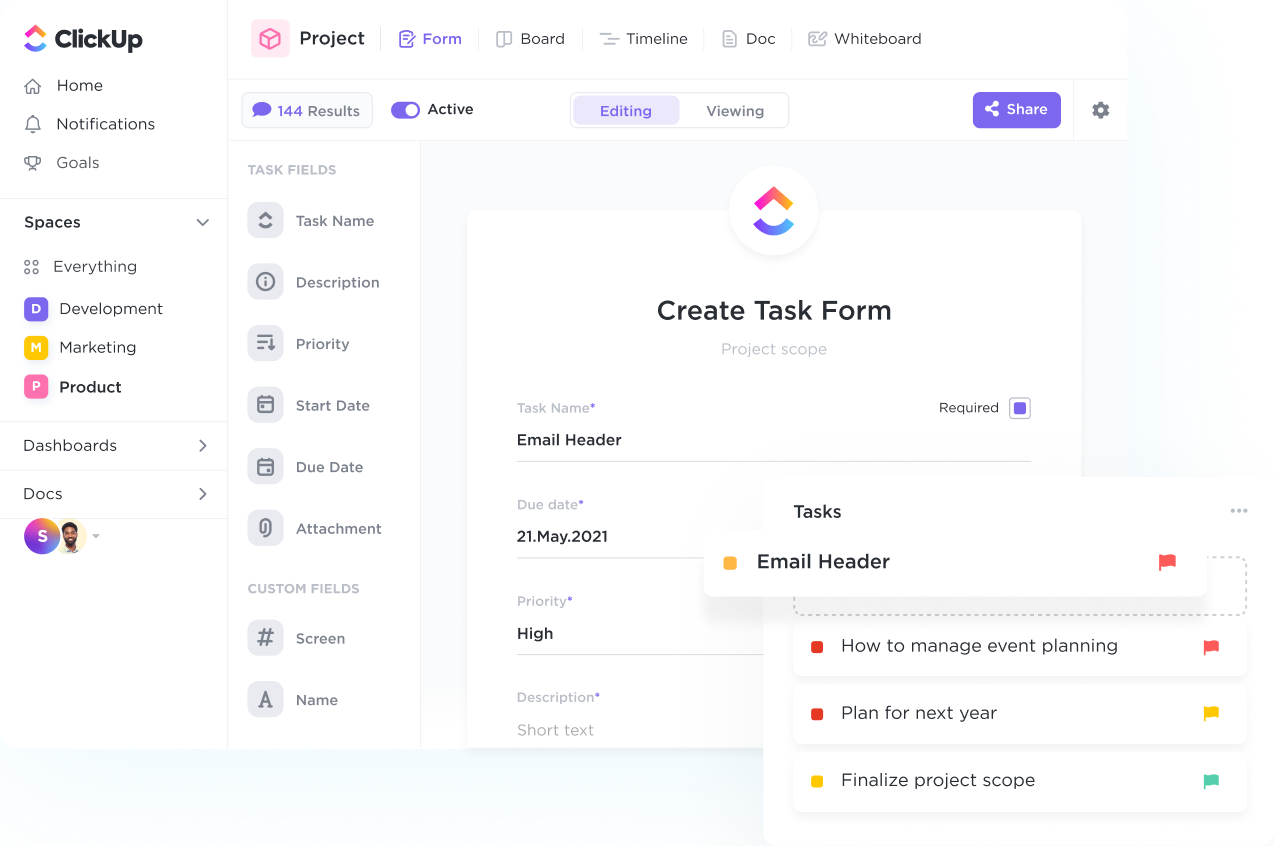Build the perfect customer database.
Create your ideal system to store and analyze contacts, customers, and deals. Add links between tasks, documents, and more to easily track all your related work.

Streamline your customer interactions with ClickUp's customizable CRM software, specially designed for Water Companies. Manage leads, track interactions, and improve customer satisfaction all in one place. With ClickUp, you can create a personalized CRM system that meets the unique needs of your business while maximizing efficiency and productivity. Elevate your customer relationships with ClickUp today.
Free forever.
No credit card.
Trusted by the world’s leading businesses
Create your ideal system to store and analyze contacts, customers, and deals. Add links between tasks, documents, and more to easily track all your related work.

Streamline your intake process, organize response data, and automatically create tasks with custom branded Forms powered by conditional logic.

Lead Tracking and Qualification: Capture leads from various sources like website inquiries or trade shows, qualify them based on project scope or budget, and nurture them through the sales process.
Pipeline Management: Visualize the progress of potential contracts, track communication with clients, and prioritize deals that are likely to close soon.
Sales Forecasting: Use historical data to predict future sales trends, allocate resources efficiently, and set realistic sales targets for the team.
Ticketing System: Manage water service requests efficiently by assigning tickets to the right department, tracking their status, and ensuring timely resolution.
Feedback Collection and Management: Gather feedback from customers regarding water quality, service satisfaction, or suggestions for improvement, and use this data to enhance customer experience.
Customer Self-Service: Provide customers with a knowledge base on water conservation tips, billing FAQs, or emergency contact information for self-help options.
Customer Behavior Analysis: Analyze water consumption patterns, peak usage times, and customer preferences to optimize service delivery and anticipate demand spikes.
Performance Dashboards: Create dashboards with key metrics like customer retention rates, average response times, and service quality indicators to monitor performance and make data-driven decisions.
Segmentation Analysis: Segment customers based on usage patterns, location, or service preferences to tailor marketing campaigns, pricing structures, and service offerings.
Centralized Database: Maintain a comprehensive database of water utility customers, including contact information, billing history, and service requests, to ensure personalized and efficient service delivery.
Interaction Tracking: Log all interactions with customers, such as service calls, meter readings, or billing inquiries, to provide a holistic view of customer engagement and history.
Relationship Mapping: Identify relationships between different accounts within a municipality or region to streamline communication, resolve issues effectively, and offer bundled services where applicable.
Process Standardization: Automate routine tasks like meter readings, billing cycles, or service appointments to ensure consistent service delivery and operational efficiency.
Alerts and Notifications: Set up automated alerts for water quality alerts, upcoming maintenance schedules, or billing reminders to keep customers informed and engaged.
Approval Processes: Streamline approval workflows for new service connections, infrastructure projects, or billing adjustments to improve compliance, transparency, and accountability.
Internal Messaging: Provide a platform for water company employees to communicate in real-time, share updates on service disruptions, coordinate emergency responses, and collaborate on projects.
Document Sharing and Management: Centralize documents related to water regulations, infrastructure plans, customer contracts, and emergency protocols to ensure all team members have access to the latest information and resources.
CRM software helps water companies improve customer satisfaction and retention by centralizing customer interactions and service history, enabling personalized communication, proactive issue resolution, and targeted marketing campaigns based on customer preferences and behavior.
Water companies should look for CRM software with features like customer account management, billing integration, service request tracking, scheduling, and communication tools to effectively manage their customer relationships.
Yes, CRM software can integrate with billing and meter reading software used by water companies, streamlining operations, improving efficiency, and providing a centralized platform for managing customer data and interactions across various systems.